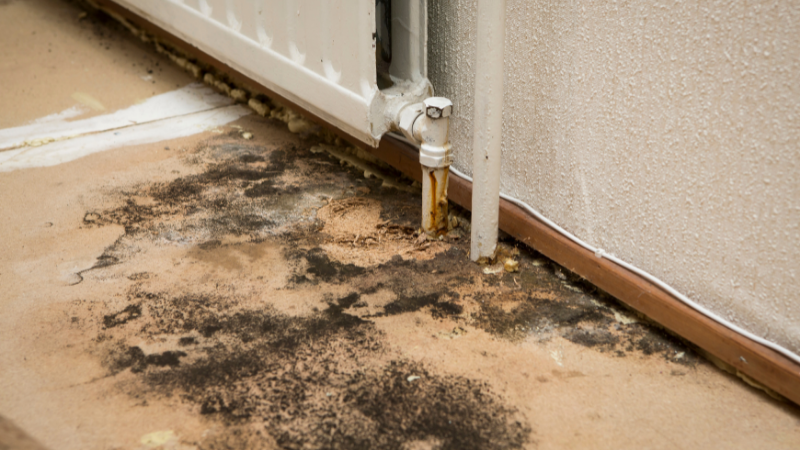Floodwater will inevitably cause serious damage to a coastal property. Floodwater that consists of saltwater is far more destructive to a building than fresh water. Here’s a look at how saltwater quickly causes more damage to coastal properties than meets the eye.
Table of Contents
Where does saltwater come from?
Oceans cover 70 percent of the earth’s surface—and these bodies of water contain salt. In fact, about 97 percent of all water on our planet is saline. Removing all the salt from the ocean and piling it onto the earth’s surface would result in a layer 500 feet thick.
Runoff from the land and openings on the sea floor are two places where salt in the oceans originates. Land rocks, for instance, are significant sources of salts dissolved in sea water. Slightly acidic rainwater erodes the rocks, sending ions into streams and rivers that eventually feed the oceans.
Salt also comes from the hydrothermal fluids released through vents on the sea floor. Cracks in sea floors are filled by ocean water, which then becomes heated by magma at the earth’s core. Chemical reactions cause the water to pick up metals, like iron, zinc, and copper, from surrounding rocks.
Underwater volcanic eruptions contribute to the salt content in oceans; these eruptions directly release minerals into the oceans. Large deposits of salt that form over millennia may also be found undersea around the globe; the salt domes add to the saltiness of ocean water.
Considering that hurricanes and coastal floods consist of ocean water, the salt content of this water will be extremely high. Floodwaters from hurricanes along the coast increase the risk of damage to coastal properties, especially since saltwater is highly corrosive—more so than fresh water.
What types of property damage occur from saltwater?
Corroded metals
Water itself is a solvent; ocean water is even more destructive, since it contains high amounts of salt. High levels of salt increase the conductivity of water, thereby accelerating the rate at which metals become corroded and organic materials are broken down.
As ocean saltwater floods building structures along the coast, the salt eats away at the metals. Resultingly, rust develops within a mere span of days. Metals that have existing damage or are already weakened will undergo major corrosion even more rapidly—often in less than one week.
Dissolved building materials
Saltwater is also destructive to building materials, such as wood, plaster, gypsum board, and drywall. Within a few days of exposure to the saltwater, these materials will dissolve. Concrete and cinder blocks, too, will become severely damaged and weakened within a few weeks.
Weakened foundation
The chemical balance of the soil surrounding foundations of coastal properties is disrupted by saltwater. When the natural chemical balance is negatively influenced, the soil becomes weaker and shifts. As a result, the property’s foundation erodes and develops cracks or other structural issues over time.
Increased water damage
In comparison to freshwater, saltwater takes significantly longer to dry. This means the walls and other porous materials in flooded coastal properties will retain the moisture for prolonged amounts of time. When the drying process takes longer, the water damage will be greater.

Risk of mold growth
Furthermore, when porous building materials remain damp with saltwater, the risk of mold colonies forming is higher. Nooks and crannies in a flooded coastal property will remain damp, and mold spores will find plenty of nourishment in the building’s moisture, oxygen, and organic food sources.
Coatings of salt
Saltwater is a menace, since salt will linger long after the water evaporates and dries. Building walls, furnishings, appliances, and all other items inside a flooded coastal property will be covered in white layers of salt. The corrosion will continue as the salt eats away at metals and building materials.
High risk of electrocution
The chances of being electrocuted rise significantly when the floodwater is made up of saltwater. Salt increases the conductivity of water. When the saltwater comes into contact with an electrical source, electrocution and shock are likely. Take safety precautions when entering saline floodwaters.
When coastal flooding or hurricanes cause water damage to a property, the homeowner should respond quickly. First, document the damage with photos for insurance purposes. The home should be surveyed to assess the level of soil erosion and to ensure it will not collapse.
Cleanup of the floodwaters should begin immediately. Consult a restoration company to clean up the floodwaters and rebuild the property. Whether the home is minimally damaged and requires only drywall replacement, or is severely ruined, qualified restoration experts will properly clean and repair it.
Got Water Related Damage?
Flood damage to a coastal property is oftentimes the result of hurricanes. Coastal flooding can occur and unleash torrents of ocean water—and salt—into the property. The abovementioned destruction will require help from the professionals at ServiceMaster by Replacements.
We are a recognized leader in water damage restoration. Whether the flooding is due to a hurricane, rainstorm, burst water pipe or appliance malfunction, our team of experienced technicians will clean up the water, rebuild where necessary, and return your property to its pre-loss condition fast.
Our IICRC certified professionals work quickly to minimize the water damage. We remove all standing water using powerful water extraction equipment. High-tech drying equipment is installed to whisk away all traces of excess moisture from the home. We also clean and restore water damaged goods.
Plus, our technicians will identify and fix the moisture source. Homeowners are urged to contact our company soon after the flood damage is discovered. Moisture is rapidly absorbed into porous building materials and will cause warping, swelling, and mold growth if not removed right away.
The flood damage cleanup services provided by ServiceMaster by Replacements is trusted by countless home and business owners in Monmouth, Union, Ocean, and Morris Counties, New Jersey, and its surrounding communities. We respond to emergency calls 24 hours a day.
Call us at (732) 842-6917 for quality water damage mitigation.







